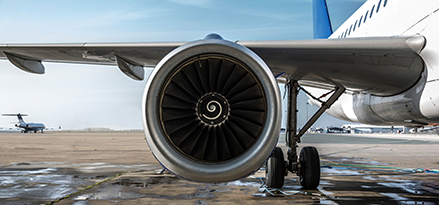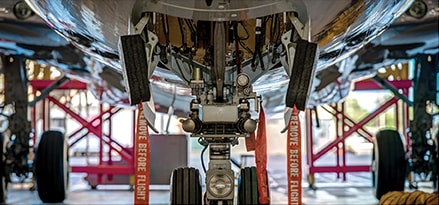This article has been edited for length. Read the full article in the November 2020 edition of Aviation Maintenance Magazine.
To say that COVID-19 has been bad for the global airline business would be a serious understatement. According to an October 2020 ICAO presentation, the pandemic’s full year (January-December 2020) impact will slash gross passenger operating revenues by up to $96 billion worldwide, and reduce the overall number of seats offered by airlines up to 47 percent.
“The pandemic has put a huge financial strain on owners and operators, and they are doing what they can to reduce spending,” says Emily Romblad, customer marketing manager with Celeste Industries Corporation. This includes parking aircraft wherever they can. “Literally every carrier in the world has taken the majority of their fleet out of service for an undetermined period of time,” says Chuck Pottier, president of Zip-Chem Products.
Engines At Risk During Parking
Aircraft engines are particularly vulnerable to corrosion when parked for extended periods of time, as is the case for many aircraft during COVID-19. “This new form of
‘medium-term’ parking presents risks,” says Ed Barnes, ExxonMobil’s global chief engineer for Aviation Lubricants. The reason: “Aviation turbine lubricants in commercial aircraft are overwhelmingly ester-based synthetic lubricants,” Barnes says. “These products have a natural affinity for water and absorb water vapor from the atmosphere at every opportunity. Once contaminated with water, turbine lubricants begin to form corrosive acids, which can become quite harmful to engine components over time.”
Exposure to elevated water contamination over time can also loosen deposits inside the engine’s lubrication system, he noted. This can present issues during test flights, or when the aircraft is returned to service.
Meanwhile, the practice of packing large numbers of parked aircraft into whatever space is available presents “an unusual challenge in itself,” Barnes says. “This crowding means engines cannot be operated or exercised and, consequently, water contamination may accumulate in their lubrication systems. Another challenge is personnel changes and ensuring there are enough people available to manage all this maintenance work.”
Protecting the Engines
Maintaining aircraft engines is a top priority for ExxonMobil, and something that Ed Barnes has thought seriously about.
“To prevent water contamination and, in turn, the risk of corrosion, there are a few maintenance considerations,” he says. “First, engines on parked aircraft need to be periodically operated – long enough to heat the lubricant and drive-off any accumulated water contamination.”
The actual schedule for these periodic operations can be determined by consulting with engine OEMs, and will vary depending on where the on-wing engines are being stored. “For instance, if an aircraft is parked in a desert location it will take longer for water to accumulate in the engine lubricant because of lower ambient humidity,” says Barnes. “In this case, operating the engine for one hour every two weeks may be enough. However, thousands of aircraft are parked today in non-desert airports all over the world and their engines may require more frequent operation for various reasons.”
Fortunately, there are steps that aircraft maintainers can take to check engine health on their own. Specifically, “we recommend periodically testing the turbine oil for water (ppm) and monitoring the total acid number (TAN), and then comparing these to the levels set by the engine OEM,” Barnes says. “If the water cannot be eliminated by engine operation, and water ppm or TAN are above engine
OEM recommended limits, the operator has a few choices: Find a way to operate the engine more frequently, periodically change the lubricant to remove the water, or move to long-term preservation of the lubricant system by adding an approved preservative chemical to the lubrication system.”
Engine lip skins also need to be inspected and protected on a regular basis. “What some airlines are starting to discover is that water and moisture are getting trapped underneath the cloth cover or plastic wrap that are covering their engines in storage,” says Av-DEC’s Jacobson. “This moisture can start to lead to corrosion on engine lip skins, which can result in expensive and time consuming repairs.” According to Jacobson, there are a few commercially options available for sealing engine lip skins, such as Av-DEC’s SF2470 sealant that provides effective moisture barrier while being easy to remove prior to return-to-service.
Lessons Learned
The impact of parking aircraft quickly during COVID-19 has provided aircraft owners and operators with valuable lessons about the importance of preventative maintenance. A case in point: “The pandemic’s effects on commercial aviation have underscored the vulnerability of turbine oil to water contamination, and the resulting degradation of the lubricant,” says ExxonMobil’s Barnes. “We recommend airlines continue their focus on maintaining the integrity of their turbine oil.”
Other lessons may take a while to make themselves apparent. For instance, “many of the airlines are currently spraying disinfection spray into their cabins between flights, and the potential corrosive effects if any might be seen in few years,” says Av-DEC’s Jacobson. “Also, many of the aircraft that are currently parked due to Covid-19 and the 737MAX grounding will need to be re-inspected before they get put back into service. As these inspections occur new corrosion issues might be discovered on the aircraft.”
The bottom line? “As extended parking or storage has become the norm for airlines during COVID-19, we anticipate that those operators that have implemented a robust maintenance and corrosion protection regime will realize the benefits of lower costs and shorter lead-times to return fleets to flight,” says ROCOL’s Parnell. “Overall, we would like to think that operators will realize the value in using high quality corrosion protection products combined with a robust maintenance regime at all times.”

